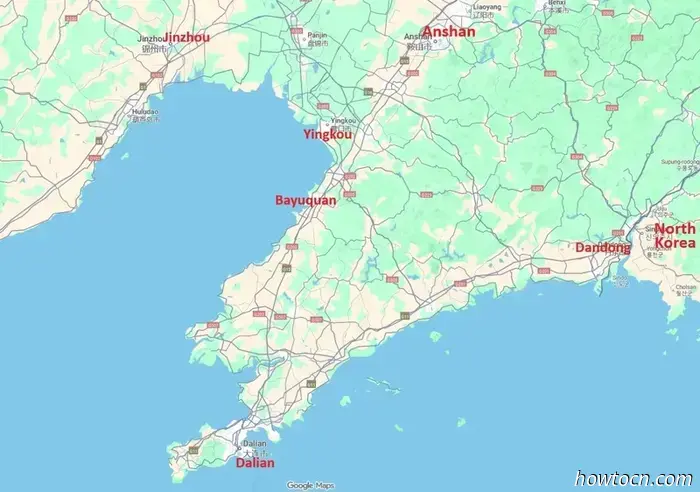
With my meticulously planned and researched itinerary for China in disarray, I decided we would essentially go with the flow for the first two weeks before heading to Yunnan. Two full days in Dalian had proven to be more than sufficient, so I chose Yingkou as our next destination. None of the cities on the Liaodong Peninsula appeared to have much to offer, and I struggled to find any English-language information about them. Yingkou at least had an "ancient street" that served as a night market and a nearby beach town that seemed somewhat intriguing. The absence of travel articles or blogs about the city suggested that even if there were no attractions for foreign tourists, we would at least experience a genuinely Chinese city. The worst outcome would simply be a couple of wasted days.
Our usual methods for finding accommodations fell short in Yingkou. There were no short-term rental options on Ctrip and Booking had no listings available. I discovered the Traders Hotel on hotels.com, a site I hadn’t used in at least twenty years. We booked two nights from Dalian just a day prior to our arrival. The train ride was only two hours long, and a taxi brought us swiftly to the hotel entrance. With Cleo staying behind in Dalian for summer camp, we were now a party of four, making taxi rides much easier. The hotel was situated at a bustling intersection in the heart of town, surrounded by malls and restaurants. It was a pleasant place with a sleek, modern design and friendly staff. Although our rooms were rather small and unremarkable, we planned to do nothing there except sleep.
Even though Yingkou might not hold much significance on a larger scale, its population of over two million would rank it among the top twenty largest metropolitan areas in the United States. It seemed logical that a city of this size would offer a variety of sights and activities in its center. We strolled down the main commercial street adjacent to our hotel and stumbled upon a few mildly interesting malls. I initially mistook an ornate red building for a temple until Mei Ling informed me it was the distinctive design for a pharmacy chain. We ascended to the top-level food court of one mall, only to find it almost deserted. There was one operational noodle stall, and we opted to make use of it rather than start our food search all over again.
As we made our way back down through the floors, we came across a bustling virtual reality game arcade. The high prices seemed steep compared to the average monthly income of a Chinese citizen, so we purchased four ride tickets for the kids, which kept them entertained for about an hour. Some local children were quite curious about our boys and engaged them in brief conversations, in which Ian and Spenser held their own quite well. The Chinese lessons they'd been taking via Zoom seemed to be yielding positive results. It was entertaining to watch the kids respond to rides in a world that only existed in their headsets.
That evening, we visited the night market on Liaohe Old Street, which was ranked as one of the city’s highlights. This street had transformed into a vibrant commercial hub after Yingkou was established as a foreign trade port in the mid-nineteenth century. We entered the street through a flimsy imitation of a paifang archway that led into a short corridor adorned with lanterns. The wide streets were flanked by brick buildings illuminated by neon lights, although they lacked any distinctive features. A collection of plaster statues depicted local residents from the nineteenth century engaging in various trades, but the material choice was unfortunate. The brown exterior had chipped away, making the statues appear as if they had been splattered with white paint.
It’s common to find carnival-style games at Chinese markets, often blatant ripoffs. They tend to be either very easy, offering prizes worth less than the cost to play, or absurdly difficult, like tossing ping pong balls into cups. I’d prefer the kids engage in the hard games and lose rather than deal with the cheap plastic toys they refuse to let me throw away.
The food stalls offered the typical snacks I've encountered at night markets throughout China. Now that the country is well-connected via the internet and travel, foods are not as regionally diverse as before; the same low-cost favorite dishes are prevalent everywhere. For instance, the beef and chicken skewers commonly found in various places are often served by Uighurs from Xinjiang (or counterfeit Uighurs). The vendors we met at Liaohe were most certainly the real deal. They had a lovely little daughter, around six years old, who dashed around and occasionally gazed at our boys with wide, brown eyes. One delicacy we hadn’t seen in Dalian this time around was deep-fried bugs. Whenever we come across such a stall, I wonder how they manage to stay in business, as these items are among the pricier offerings, with most locals bypassing them. Since such dishes are unique to China and I find






























After my meticulously planned itinerary for China fell apart, I decided to go with the flow for the first two weeks before heading to Yunnan. Two full days in Dalian had been sufficient, and I chose Yingkou as our next destination. The cities on the Liaodong Peninsula appeared to offer little, and I struggled to find any information in English about them. Yingkou at least boasted an "ancient street" that also served as a night market, along with a nearby beach town that seemed somewhat intriguing. The absence of travel articles or blogs about the city suggested that, even if there were no attractions for foreign tourists, we would still get to experience a truly Chinese city. The worst-case scenario would be simply wasting a couple of days.